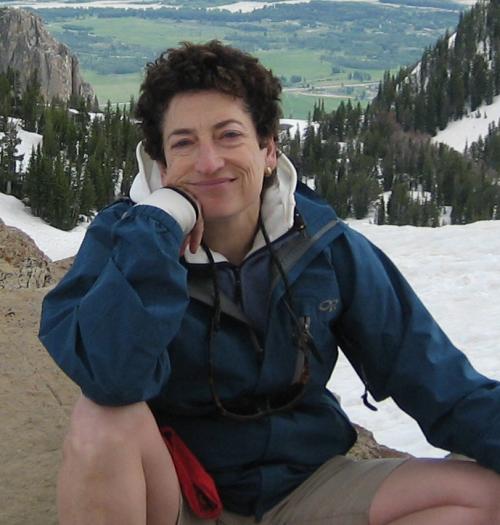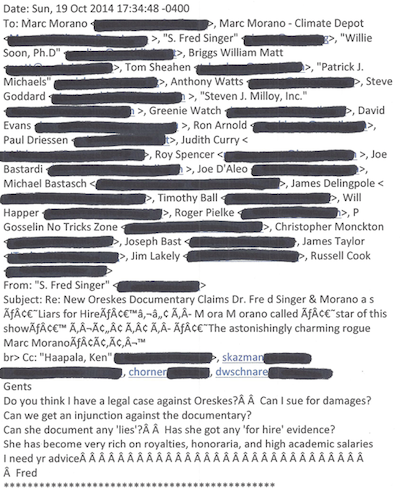 I first learned about science historian Naomi Oreskes in 2004, when she published a paper in Science documenting the scope of the scientific consensus behind climate change. She and her research assistants surveyed the scientific literature to that date, categorizing which papers supported the scientific consensus (as stated by the IPCC) that humans are responsible for most of the recent global warming, which papers disputed that point, and which papers took no stance. In the sample of nearly 1000 papers, she found none which explicitly disputed the consensus. She concluded: “there is a scientific consensus on the reality of anthropogenic climate change. Climate scientists have repeatedly tried to make this clear. It is time for the rest of us to listen.”
I first learned about science historian Naomi Oreskes in 2004, when she published a paper in Science documenting the scope of the scientific consensus behind climate change. She and her research assistants surveyed the scientific literature to that date, categorizing which papers supported the scientific consensus (as stated by the IPCC) that humans are responsible for most of the recent global warming, which papers disputed that point, and which papers took no stance. In the sample of nearly 1000 papers, she found none which explicitly disputed the consensus. She concluded: “there is a scientific consensus on the reality of anthropogenic climate change. Climate scientists have repeatedly tried to make this clear. It is time for the rest of us to listen.”
Climate change deniers leapt on the paper, attempting to dispute or cloud the conclusions. Roger Pielke Jr. wrote to Science, contending that her work was “a caricature” of the underlying science. She replied:
A full debate on the moral, social, political, ethical, and economic ramifications of possible responses to climate change—as well as the ramifications of inaction—would be a very good thing. But such a debate is impeded by climate-change deniers. In this respect, I am in complete agreement with Pielke’s conclusion, which was precisely the point of my Essay: Proxy debates about scientific uncertainty are a distraction from the real issue, which is how best to respond to the range of likely outcomes of global warming and how to maximize our ability to learn about the world we live in so as to be able to respond efficaciously. Denying science advances neither of those goals.
In 2005, she took part in a conference at Stanford that brought together leaders in the study of agnotology, a term coined by conference organizer Robert Proctor to describe “the cultural production of ignorance (and its study).” Climate change was not her first brush with the cultural production of ignorance. Her previous monograph—The Rejection of Continental Drift: Theory and Method in American Earth Science—chronicled how Wegener’s work on continental drift was ignored for decades, until shifts in the culture of geology made it possible for scientists to integrate the theory into their idea of how science works. It is a critical and thoughtful look at the way science works, puncturing myths that scientists told themselves about their openness to new ideas and exploring how knowledge is acquired, ignored, disputed, and accepted. Her scholarship was so brilliant and innovative that she won the Society of Economic Geologists’ Lindgren Prize for outstanding work by a young scientist (usually given for work digging in the dirt, rather than in archives).
Oreskes’ talk at the 2005 agnotology conference—“Deny, Deny, Deny: How to Sow Confusion over Climate Change”—took on a different sort of enforced ignorance. In a preview of the argument made at length in her 2010 book Merchants of Doubt, written with Erik Conway, she traced the way that a group of physicists, in thrall to an ideology of what she calls “market fundamentalism,” attacked emerging science on topics ranging from smoking and acid rain to the ozone hole, and ultimately climate change. It’s a brilliant example of the power of careful academic work to expose the roots of pernicious social movements (a distinction shared by the work of Friend of Darwin winner Ronald Numbers).
 Climate change denier Fred Singer, a subject of the book and movie Merchants of Doubt, writes to a list of prominent climate change deniers, looking for advice on how to silence Oreskes. DeSmogBlog and E&E News obtained the email from a source who received it as a forward.
Climate change denier Fred Singer, a subject of the book and movie Merchants of Doubt, writes to a list of prominent climate change deniers, looking for advice on how to silence Oreskes. DeSmogBlog and E&E News obtained the email from a source who received it as a forward.Merchants of Doubt is now a major motion picture from Sony Pictures Classics, and the hard work she and Conway and their colleagues have done will reach an even wider audience. Like the Oscar- and Nobel-winning An Inconvenient Truth, it serves as a rallying point for those concerned about the risks posed by climate change and by science denial, and anyone who has been “on the losing end of a hustle.” In the film and her appearances before film audiences and the media, Oreskes has urged viewers to find ways, however small, that they can get involved in the task of confronting climate change. From her own experience, she acknowledges that people may face criticism and attacks for stepping forward, but that we should not flinch from it. She certainly hasn’t.
Her depth of knowledge, and appreciation of how science works, and how science is attacked and ignored, led me to invite her to join me on a panel at 2010’s Netroots Nation. The video of her talk shows her passion for the issue, and for the necessity of communicating clearly what the science tells us. She closed with a nod to the great scientist and communicator Stephen Schneider, who had died only days earlier after a lifetime dedicated to conducting climate research and explaining what he and his colleagues had learned to the rest of us. “Now that Steve is gone, more people are going to need to step up into that void.”
NCSE expanded into climate change a year later. While the topic had been on my mind earlier, Oreskes’ research connecting climate change denial to a broader science denial movement, and her work characterizing the depth of scientific consensus, provided critical ammunition in my efforts and those of others here at NCSE to broaden our focus to include climate change denial.
Little wonder that she would be given NCSE’s 2015 Friend of the Planet Award. Her work has deepened our understanding of the earth’s history and the history of the study of the earth. She shone a crucial light on the growth and expansion of the scientific consensus on climate change, and illuminated the history and structure of the denialist social movement. She has come under attack from climate change deniers, and stood up to them bravely. From her undergraduate days studying mining geology in the UK’s Royal School of Mines to her work at Stanford, UCSD, and now Harvard, she has shown herself to be a true Friend of the Planet, and a powerful voice for action to protect it.

